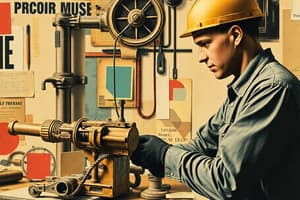Podcast
Questions and Answers
फिटर बनने के लिए आवश्यक कौशल में से कौन सा कौशल्य सबसे महत्वपूर्ण है?
फिटर बनने के लिए आवश्यक कौशल में से कौन सा कौशल्य सबसे महत्वपूर्ण है?
- तकनीकी कौशल (correct)
- लेखन कौशल
- सामाजिक कौशल
- आरंभिक कौशल
फिटर्स की प्रमुख जिम्मेदारियों में से किसकी आवश्यकता होती है?
फिटर्स की प्रमुख जिम्मेदारियों में से किसकी आवश्यकता होती है?
- सफाई का काम
- वेबसाइट निर्माण
- आवश्यक उपकरणों की तैयारी
- इंजीनियरिंग सिद्धांतों का ज्ञान (correct)
फिटर के लिए सुरक्षा जागरूकता क्यों महत्वपूर्ण है?
फिटर के लिए सुरक्षा जागरूकता क्यों महत्वपूर्ण है?
- दुर्घटनाओं को रोकने और उद्योग मानकों का पालन करने के लिए (correct)
- अपनी आय बढ़ाने के लिए
- वे बेहतर सूचनाएँ प्राप्त कर सकें
- कार्य का बेहतर प्रबंधन कर सकें
फिटर्स द्वारा उपयोग किए जाने वाले उपकरणों में से कौन सा निम्नलिखित में से एक नहीं है?
फिटर्स द्वारा उपयोग किए जाने वाले उपकरणों में से कौन सा निम्नलिखित में से एक नहीं है?
फिटर बनने के लिए किस प्रकार की प्रशिक्षण कार्यक्रम सामान्यतः मौजूद हैं?
फिटर बनने के लिए किस प्रकार की प्रशिक्षण कार्यक्रम सामान्यतः मौजूद हैं?
फिटर की कार्यशैली में सबसे अधिक ध्यान किस पर होना चाहिए?
फिटर की कार्यशैली में सबसे अधिक ध्यान किस पर होना चाहिए?
फिटर को कौन से विशेष प्रकार के उद्योगों में कार्य करने की संभावना सबसे अधिक होती है?
फिटर को कौन से विशेष प्रकार के उद्योगों में कार्य करने की संभावना सबसे अधिक होती है?
फिटर के कार्य में समस्या समाधान की आवश्यकता क्यों होती है?
फिटर के कार्य में समस्या समाधान की आवश्यकता क्यों होती है?
Flashcards
फिटर क्या होता है?
फिटर क्या होता है?
मशीनरी और उपकरणों की स्थापना, मरम्मत या रखरखाव में कुशल व्यक्ति।
फिटर के लिए कौन से तकनीकी कौशल ज़रूरी हैं?
फिटर के लिए कौन से तकनीकी कौशल ज़रूरी हैं?
हाइड्रोलिक्स, न्यूमेटिक्स और बिजली के यांत्रिक सिद्धांतों की गहरी समझ।
फिटर के लिए कौन से व्यावहारिक कौशल ज़रूरी हैं?
फिटर के लिए कौन से व्यावहारिक कौशल ज़रूरी हैं?
सटीकता और निपुणता की ज़रूरत होती है, खासकर जटिल कार्यों के लिए। उपकरणों की खराबी का पता लगाने की क्षमता।
फिटर के लिए कौन से संचार कौशल ज़रूरी हैं?
फिटर के लिए कौन से संचार कौशल ज़रूरी हैं?
Signup and view all the flashcards
फिटर के लिए सुरक्षा जागरूकता क्यों ज़रूरी है?
फिटर के लिए सुरक्षा जागरूकता क्यों ज़रूरी है?
Signup and view all the flashcards
फिटर को क्यों ध्यान से काम करना चाहिए?
फिटर को क्यों ध्यान से काम करना चाहिए?
Signup and view all the flashcards
फिटर बनने के सामान्य तरीके क्या हैं?
फिटर बनने के सामान्य तरीके क्या हैं?
Signup and view all the flashcards
फिटर विभिन्न उद्योगों में क्या काम करते हैं?
फिटर विभिन्न उद्योगों में क्या काम करते हैं?
Signup and view all the flashcards
Study Notes
Definition and Scope
- A fitter is a skilled professional who installs, repairs, or maintains machinery and equipment.
- This role involves a wide range of tasks, from simple adjustments to complex repairs, depending on the industry and equipment type.
- Fitters frequently use their hands and need precision in their work.
Skills and Qualities
- Technical skills: A strong understanding of mechanical principles (hydraulics, pneumatics, electricity) is essential. Proficiency in various tools and equipment is crucial.
- Practical skills: Precision, dexterity, and problem-solving abilities are needed to diagnose equipment issues and perform intricate tasks.
- Communication skills: Effective communication with technicians, engineers, and operators is necessary for clear technical reports and explanations.
- Safety awareness: Understanding safety procedures and regulations is vital for accident prevention and compliance.
- Attention to detail: Accurate work is crucial for safe and reliable machinery operation.
Training and Experience
- Formal training programs, apprenticeships, and on-the-job learning are common ways to become a fitter.
- Apprenticeship programs combine practical experience with theoretical knowledge.
- Experience in a specific industry or with a particular type of equipment often leads to specialization.
Specific Industries and Tasks
- Fitter tasks vary greatly by industry.
- Examples include:
- Repairing and maintaining industrial machinery (e.g., presses, conveyors, engines).
- Constructing and installing pipelines.
- Fabricating and assembling structural steelwork.
- Troubleshooting and repairing mechanical issues on vehicles.
- Working with complex systems like HVAC or plumbing.
- Modifying equipment for specific needs or upgrades.
- Installing, aligning, and maintaining rotating equipment.
Tools and Equipment
- Fitters use a wide variety of tools, including hand tools (screwdrivers, wrenches, pliers), power tools (grinders, drills, saws), measuring instruments (calipers, micrometers), and industry-specific equipment.
- Tool selection depends on the task and the equipment being worked on.
Job Outlook and Compensation
- Fitter demand fluctuates based on economic conditions and industry needs.
- Generally, there is stable job outlook in industrial sectors needing maintenance and repairs.
- Compensation varies based on experience, location, and industry.
Related Roles
- Related roles include mechanical engineers, maintenance technicians, and repair technicians.
- Fitters focus on hands-on work, while engineers may have a broader, more theoretical focus.
- There's a growing need for fitters with advanced skills in troubleshooting complex machinery.
Studying That Suits You
Use AI to generate personalized quizzes and flashcards to suit your learning preferences.
Description
इस क्विज में फिटर के कार्य, कौशल और क्षमताओं के बारे में जानकारी दी गई है। फिटर मशीनरी और उपकरण के इंस्टॉलेशन, मरम्मत और रखरखाव में विशेषज्ञ होते हैं। आपके लिए यह समझना महत्वपूर्ण है कि यह भूमिका क्या-क्या सीखने का मौका देती है।




